Business & Industry
The Perth & Kinross Climate Action Plan provides our overall vision to ensure we achieve a low carbon and climate resilient Perth & Kinross. The plan identifies business and industry as a key area where we will have to make changes in order to tackle and adapt to climate change. The Perth and Kinross economy is made up of over 7,000 businesses employing more than 56,000 people across the region. Business and Industry, along with Waste and Resources Management therefore plays a crucial role in the economy of the region but is also a key contributor to carbon emissions.
Business and industry emissions make up roughly 15% of Perth and Kinross’s overall CO2 emissions in 2021. This consists of emissions from energy, transport and processes for commercial, industry and waste and resources management sectors. If agriculture emissions are added (28%), this would increase to 43%.
Individual businesses are becoming more sustainable through reducing water and energy use; reducing waste including packaging, reducing fuel used, road and air miles; improving transport efficiency; encouraging employees to change behaviours and culture; redesigning processes, products and services, value chains; and increasing use of local supply chains.
We have ambitious targets to meet in achieving a net-zero nation and alongside these targets should remain the focus on green credentials, saving money and creating job and business opportunities to continue to support the region’s economy.
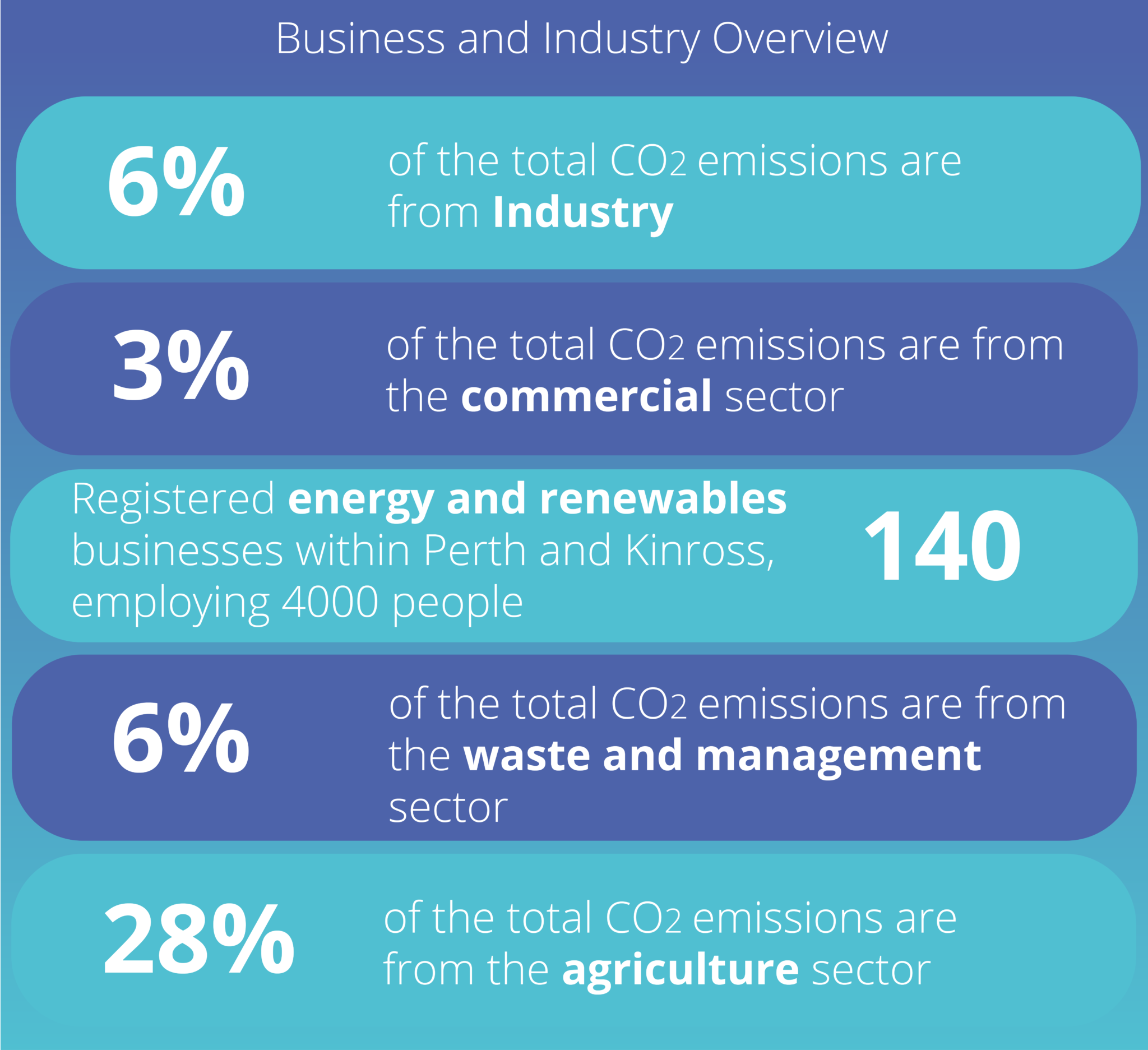
Industrial and commercial emissions in Perth and Kinross in 2019 were a combined 233.2 kt CO2 (BEIS, 2021). There have been steady decreases and this represents a 36% drop against the 2005 baseline. Within this, the two largest emissions sources are from Agriculture (37%) and Commercial Electricity (19%).
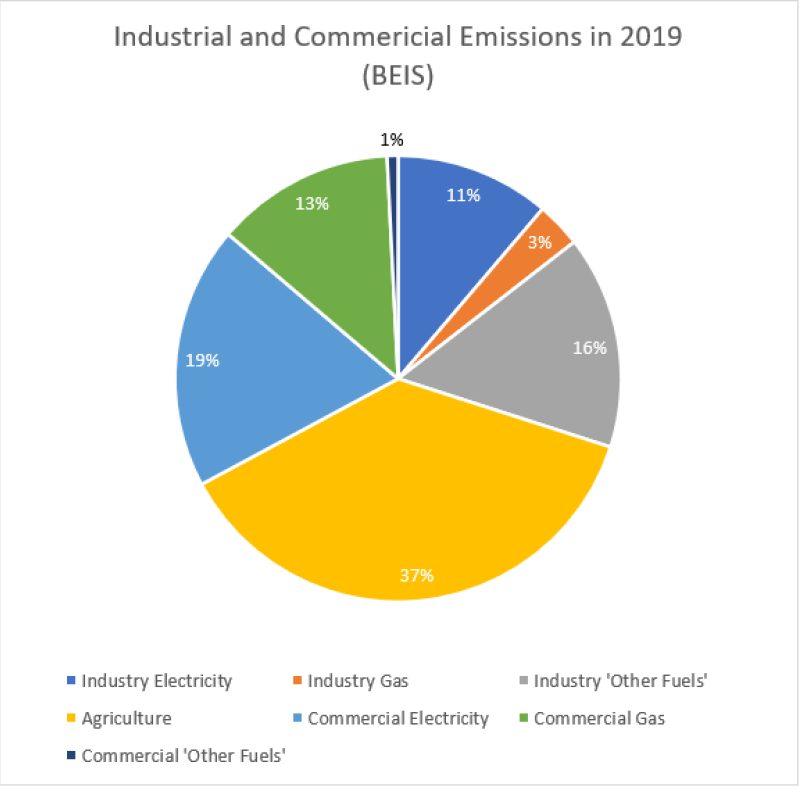
No One Left Behind: Through this scheme, Perth and Kinross Council provides funding for businesses to create new jobs, and up-skill or train employees. It seeks to address the skills shortage to support the green economy.

Business Gateway: Through the Business Gateway, Perth & Kinross Council is providing practical help, advice and support for new and growing businesses in Perth & Kinross area. Perth & Kinross Council funds the Business Gateway to act as a one stop contact point for business enquiries, including environmental responsibilities.

Buy Local, Eat Local – In Partnership with Small City Big Personality and Perthshire Chamber, Perth & Kinross Council have been promoting local food and drink, which 200 local businesses have registered with. This has been particularly important during the pandemic, showcasing the food and drink businesses that continued to serve us during lockdown. Eating locally and seasonally produced food can help reduce your carbon footprint.
Image source: Perthshire Chamber
Zero Carbon Bus Tour: Perth was one of the flagship stops of the stops of the Zero Carbon Bus Tour, a series of events showcasing the amazing efforts being undertaken – both locally and globally – to aid in the transition to a net zero carbon economy.
The event aimed to bring together a range of businesses to illuminate notable initiatives taking place in the region, and an objective to foster further connections within the community in support of the Council’s Climate Emergency Action Plan, established in 2019.
Perth & Kinross Council assembled a group of captivating speakers to provide insight and showcase actions local businesses are taking to reduce emissions and reach net zero targets.
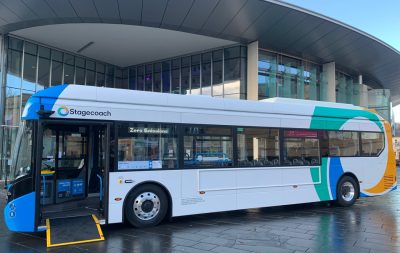
Stagecoach presented about how they are planning to operate their UK bus fleet with zero emissions by 2035, you can watch an interview with Steven Stewart from Stagecoach. Passenger volumes are currently at 70% of pre-covid levels, though this is being addressed through government investment.
Aviva Carbon Reductions: Aviva are working to reduce their carbon emissions, achieving a 67% reduction in carbon emissions based on 2010. They are doing this through reducing energy consumption out of hours and using the data at hand to become as energy efficient as possible. Reducing waste in energy, food, and resources is essential in tackling climate change. For more information you can watch an interview with Lee Preston from Aviva.

PKC’s Commercial Waste Team: Perth & Kinross Council's waste team is providing support and infrastructure to help businesses reduce and minimise their waste. By reducing the amount of food waste that your business generates, long-term you might be able to decrease the number of food waste collections needed from your premises and/or decrease the size of your food waste bin, saving you money.
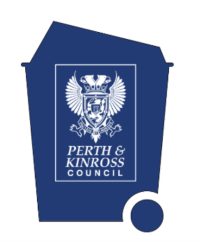
The following key business and industry themes have been identified:
Business Engagement & Empowerment by supporting large employers to lead and champion Net Zero and encouraging SMEs to participate.
Business Support by providing information, advice, finance to SMEs to reduce their carbon emissions, resilience and by delivering joint key projects in transport and energy.
Addressing just transition and skills shortage by supporting access to skills and job opportunities particularly with large employers and their supply chains.
Measuring Performance by building up baseline data and enabling businesses to measure their performance through tools and learning sharing.
A climate emergency has been declared internationally and recognised by both the UK and Scottish Governments. The key long-term target is to ensure Perth & Kinross is Net Zero by 2045 at the latest. To achieve this, the majority of action required must be underway by 2030.
Unlike the other thematic areas, the policy drivers are less overarching and more sector specific than for other themes. Many of the drivers for business actions are the net zero policies of other businesses. For example, some of the largest employers in Perth and Kinross, such as Aviva, SSE, Stagecoach, Highland Spring and Tesco, have committed to the UN’s Race to Zero Campaign. This means they are requiring, or will require, their suppliers to have Science Based Target Initiative net zero commitments in place as soon as 2023.
The following road map provides an overview of the actions which Perth & Kinross Council will undertake to achieve these targets in relation to business and industry.
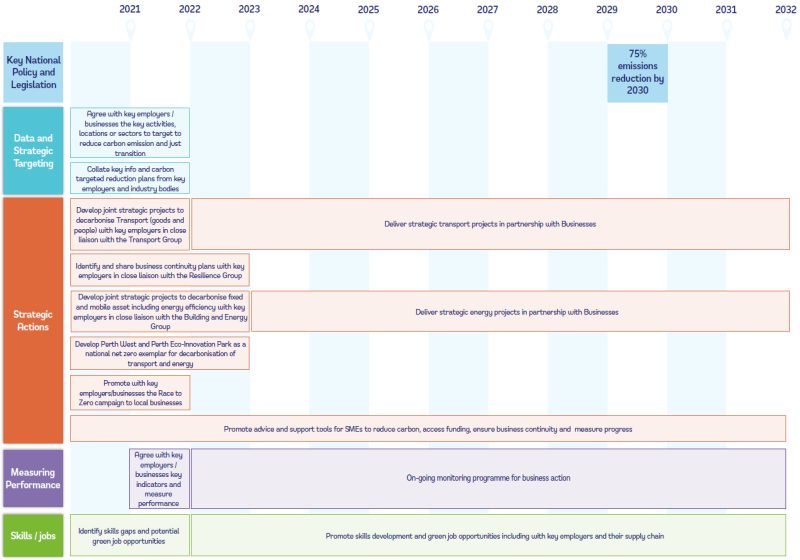
The following key challenges and opportunities have been identified and assessed during the development of our Climate Action Plan. We have implemented a strategic plan to reduce or eliminate the possible impacts of challenges and we are focusing on potential opportunities, implementation, and outcomes.
Clean Growth
Businesses are faced significant challenges to recover from the knock on effects of COVID-19 and inflation crisis. Clean Growth to address climate change is identified as one of the key opportunities to help the local economy to recover and grow. Clean Growth is a priority to create jobs and support business start-ups and growth
Job Creation
Changing demand and supply chain will have an impact on skills and jobs where employees will have to train to gain new or enhanced qualifications to sustain their jobs or start new jobs. There is significant potential for green job creation with STUC research from 2021 indicating the potential for 131,000-367,000 new green jobs across Scotland over the next 15 years.
Skills & Capacity
We are facing large and persistent skills gaps and skills shortages, that may hamper ability to meet Net Zero ambitions. Perth & Kinross Council intends to help businesses become resilient to climate change and is working hard to ensure they can improve workforce capacity. Investing in upskilling and the training of employees will help foster a transition to a more resilient economy. It is also crucial that the transition is fair and that people who could be affected by, or benefit from the transition are supported - such as people facing barriers to access training or jobs opportunities. Perth & Kinross Council has a role to play as an employer, but also by continuing to provide employability support services.
Infrastructure & Innovation
Driving innovative solutions and supporting business with new business models is essential to overcoming barriers. For example, the Food & Drink Collaborative Innovation Fund is a £650k fund which aims to encourage a culture of collaborative innovation by addressing key opportunities or challenges in the food and drink sector. The programme is focused on SME’s within Scotland's food and drink sector. Key interests are in incremental and disruptive product, process or business model innovation that leads to new growth in the food and drink sector.
Supporting SMEs
Small and Medium Enterprises will require to be supported to rise to these challenges, mainly by the provision of information and advice, but potentially also by financial incentives or support. Perth & Kinross Council will have a key role to play in supporting business support agencies, networks and industry bodies to signpost and support SMEs. Examples of these resources include:
- Zero Waste Scotland offers a range of grant and loan schemes plus advice for SMEs to build a zero and circular waste economy.
Circular Economy
Promoting a rapid transition to a Circular Economy presents many opportunities. A circular economy will aim to reduce consumption of resources and make better use of existing resources to support key economic sectors, employment, and wellbeing.
Measure and analyse Greenhouse Gas Emissions
Measuring GHG emissions allows business owners to identify their activities that are creating the highest pollutants. After which, businesses can consider ways to reduce their emissions.
Work to change behaviours
Enforcing rules to be carbon neutral inside their offices can get employees used to implementing a more sustainable lifestyle, and permanently change behaviours and attitudes, helping fight climate change.
Ensure supply chains are sustainable
For a business to become carbon neutral, it will require its supply chain to also become carbon neutral.
Reduce energy usage
Investing in energy efficient lighting, switching devices off when they are not needed, and lowering the heating can help businesses reduce their energy consumption.
Reduce waste
There are numerous ways businesses can reduce waste including in the packaging they use, avoiding printing where unnecessary, and sorting waste for recycling correctly.
Improve employee transportation
Businesses can reduce their CO2 emissions through encouraging their employees to avoid using private cars to get to work and instead walking and cycling, using public transport, and car sharing.
The following Key Performance Indicators have been developed to enable progress and monitor climate action related to Business and Industry. The KPI framework will be further developed during 2022.
Key Theme |
Performance Indicator |
Baseline Value |
Data & Strategic Targeting |
Number of registered businesses by growth sector (and % SME):
|
|
% of large businesses (250+ employees) with a set target for reducing carbon emissions |
Indicator methodology and baseline under development – to be finalised in 2022 |
|
Engagement & Empowerment |
Number of businesses signed up to the ‘Race to Zero’ campaign or equivalent |
Indicator methodology and baseline under development – to be finalised in 2022 |
Number of businesses supported through climate change initiatives |
Indicator methodology and baseline under development – to be finalised in 2022 |
|
Just Transition and Skills Shortage |
Share of Green Jobs in Perth and Kinross overall employment |
Indicator methodology and baseline under development – to be finalised in 2022 |
Skills and training KPI – To be developed |
Indicator methodology and baseline under development – to be finalised in 2022 |
|
Total turnover and employee numbers from Sustainable Tourism |
600 sustainable tourism businesses, 9000 employed (2019) |
Further information and support can be found at the following links:
Reduce Your Carbon Emissions to Net Zero - The NetZeroToolkit for Businesses
Calculate Your Business Emissions - SME Climate hub
PKC - Business Advice and Funding
Business Gateway - Local support
Invest in Perth - Funding Support
Scottish Government - Engagement with Business on Climate Action
Contact Information
For more information on the changes business and industry can make in order to tackle and adapt to climate change, please contact [email protected]

